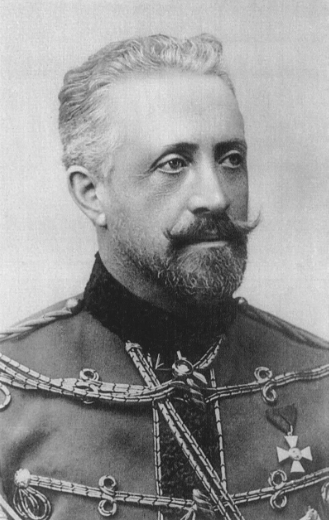Grand Duke Nikolai Nikolaevich (Romanov) (1856-1929)

Grand Duke Nikolai Nikolaevich (Romanov)
Source
Source
The Grand Duke was born on November 6, 1856, to the family of Adjutant General Grand Duke Nikolai Nikolayevich (the Senior) and Grand Duchess Aleksandra Pavlovna of Oldenburg. In 1870, Nikolai Nikolaevich (the Younger) began his studies at the Nikolaev Engineering School. From 1873–1876, the Grand Duke studied at the Nicholas General Staff Academy. During the Russo-Turkish War of 1877–1878, he became an officer for special assignments under his father. In 1885, he was promoted to major general.
From 1895 to 1905, he served as inspector general of the cavalry. In 1907, the Grand Duke married Anastasia Nikolaevna (Stana), the daughter of the Montenegrin knyaz Nikolai Negosh. Stana almost immediately began to play a prominent role in the aristocratic life of St. Petersburg. With the outbreak of the First World War, the Grand Duke was appointed commander-in-chief of the Russian troops. On August 23, 1915, Emperor Nicholas II took over as commander in chief. Grand Duke Nikolai Nikolaevich the Younger was appointed viceroy in the Caucasus and commander-in-chief of the Caucasian Front.¹
At the start of 1917, Nikolai Nikolayevich did not support the revolution. He decided to leave his military activities and, in 1918, left for the Dulber Palace on the Crimea, which belonged to his younger brother Pyotr Nikolaevich. At the end of March 1919, Grand Duke Nikolai Nikolaevich the Younger and his family left Russia on the English battleship HMS Marlborough.
From 1895 to 1905, he served as inspector general of the cavalry. In 1907, the Grand Duke married Anastasia Nikolaevna (Stana), the daughter of the Montenegrin knyaz Nikolai Negosh. Stana almost immediately began to play a prominent role in the aristocratic life of St. Petersburg. With the outbreak of the First World War, the Grand Duke was appointed commander-in-chief of the Russian troops. On August 23, 1915, Emperor Nicholas II took over as commander in chief. Grand Duke Nikolai Nikolaevich the Younger was appointed viceroy in the Caucasus and commander-in-chief of the Caucasian Front.¹
At the start of 1917, Nikolai Nikolayevich did not support the revolution. He decided to leave his military activities and, in 1918, left for the Dulber Palace on the Crimea, which belonged to his younger brother Pyotr Nikolaevich. At the end of March 1919, Grand Duke Nikolai Nikolaevich the Younger and his family left Russia on the English battleship HMS Marlborough.
In exile from April 1919, he lived in Italy in Genoa as a guest of King Victor Emmanuel III. Together with his younger brother Peter Nikolayevich and his family, Grand Duke Nikolai Nikolayevich moved to France in 1922. The Romanovs lived at the Villa Thenard in Antibes.² There he lived under the name “Borisov”. From July 1923, the family of Nikolai Nikolaevich lived in a country house in Val-de-Marne, in the castle of Choigny. On November 16, 1924, Grand Duke Nikolai Nikolayevich took over the leadership of the Russian All-Military Union (ROVS). He did not obtain real power in the organization; however, he was respected among the officer corps and generals. General Pyotr Krasnov often visited the knyaz. In 1926, Baron Pyotr Nikolaevich Wrangel, in personal correspondence, reported on conflicts within the ROVS with the participation of Nikolai Nikolaevich and General Kutepov.³ In general, Nikolai Nikolayevich was more of an honorary chairman of the ROVS than its real leader. The Grand Duke died at his Villa Thenard in Antibes on January 5, 1929.⁴

Content Oriented Web
Make great presentations, longreads, and landing pages, as well as photo stories, blogs, lookbooks, and all other kinds of content oriented projects.
[1] Chuvardin, German. ‘Velikii knyaz’ Nikolai nikolayevich-mladshii i epokha upushchennykh vozmozhnostey (biograficheskiy podkhod)’. Uchenyye zapiski OGU. Seriya: Gumanitarnyye i sotsial’nyye nauki, no. 1(74) (2017). https://cyberleninka.ru/article/n/velikii-knyaz-nikolai-nikolaevich-mladshii-i-epoha-upuschennyh-vozmozhnostey-biograficheskiy-podhod.
[2] Danilov, Yuriy. Velikiy knyaz’ Nikolay Nikolayevich. Moskva; Berlin: Direkt-Media, 2017.
[3] Seregin, Andrei. ‘Bor’ba za rukovodstvo v rossiyskoy voyennoy emigratsii v Yevrope v 1920-kh godakh. Analiz istoriografii’. MNIZH, no. 1-4(43) (2016). https://cyberleninka.ru/article/n/borba-za-rukovodstvo-v-rossiyskoy-voennoy-emigratsii-v-evrope-v-1920-h-godah-analiz-istoriografii.
[4] Gosudarstvennoye upravleniye Rossii v portretakh. ‘Velikiy knyaz’ Nikolay Nikolayevich Mladshiy’. Gosudarstvennoye upravleniye Rossii v portretakh (blog), 2017. http://deduhova.ru/statesman/nikolaj-nikolaevich-mladshij/.
[2] Danilov, Yuriy. Velikiy knyaz’ Nikolay Nikolayevich. Moskva; Berlin: Direkt-Media, 2017.
[3] Seregin, Andrei. ‘Bor’ba za rukovodstvo v rossiyskoy voyennoy emigratsii v Yevrope v 1920-kh godakh. Analiz istoriografii’. MNIZH, no. 1-4(43) (2016). https://cyberleninka.ru/article/n/borba-za-rukovodstvo-v-rossiyskoy-voennoy-emigratsii-v-evrope-v-1920-h-godah-analiz-istoriografii.
[4] Gosudarstvennoye upravleniye Rossii v portretakh. ‘Velikiy knyaz’ Nikolay Nikolayevich Mladshiy’. Gosudarstvennoye upravleniye Rossii v portretakh (blog), 2017. http://deduhova.ru/statesman/nikolaj-nikolaevich-mladshij/.